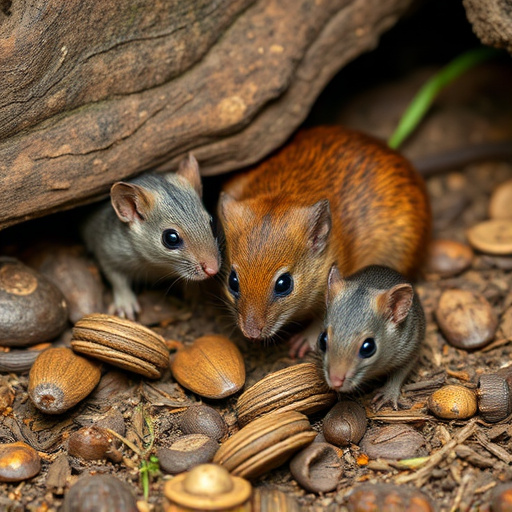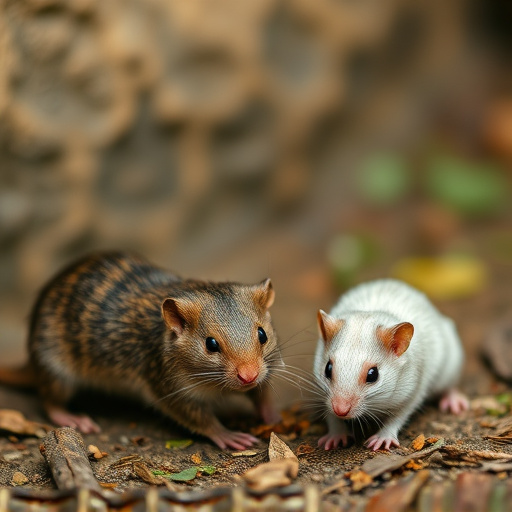Rodents in Oro Valley, Arizona, exhibit distinct seasonal activity patterns influenced by temperature, food availability, and breeding cycles. Cooler months see increased rodent activity near human habitats, necessitating effective rodent control Tucson strategies. Common species include house mice, deer mice, and California ground squirrels. Seasonal factors drive their activity, with food scarcity in winter attracting them to residential areas. Effective prevention involves sealing entry points, maintaining landscaping, and strategic baiting programs. Early identification of infestations is crucial, requiring regular inspections and professional rodent control Tucson services for tailored solutions. A collaborative community approach, combining physical barriers, proper maintenance, and knowledge sharing, ensures a rodent-resistant environment year-round.
Explore seasonal rodent activity patterns in Oro Valley homes and neighborhoods. This comprehensive guide delves into the behavioral trends of rodents, focusing on common species found in Tucson areas. Learn how factors like weather and food availability influence their activity, and discover signs indicating infestation during winter and summer months. Gain insights into effective rodent control strategies tailored for local homes, along with a community-focused approach to prevent seasonal rodent problems, ensuring a more secure living environment through optimal rodent control Tucson.
- Understanding Rodent Behavior: Seasonal Trends in Oro Valley
- Common Rodent Species Found in Tucson Homes
- Factors Influencing Rodent Activity in Neighborhoods
- Identifying Signs of Rodent Infestation in Winter and Summer
- Effective Rodent Control Strategies for Local Homes
- Community Approach to Preventing Seasonal Rodent Problems
Understanding Rodent Behavior: Seasonal Trends in Oro Valley

In Oro Valley, like many regions across Arizona, rodents exhibit distinct seasonal activity patterns. These trends are heavily influenced by environmental factors such as temperature, food availability, and breeding cycles. Understanding these seasonal shifts is crucial for effective rodent control Tucson residents often require. During the cooler months, rodents tend to be more active as they seek warmer habitats, leading to increased interactions with humans and their properties. Conversely, in the hotter summer season, many species become less conspicuous, though they still pose a constant threat to homes and neighborhoods.
Knowing these behavioral changes allows homeowners and pest control specialists to implement targeted strategies for rodent control Tucson environments. Seasonal trends play a vital role in determining when and where to focus prevention efforts, ensuring a more effective and efficient approach to managing rodent populations year-round.
Common Rodent Species Found in Tucson Homes

In the warm, arid climate of Tucson, several rodent species have made homes in and around Oro Valley neighborhoods. The most common rodents found include the house mouse (Mus musculus), deer mouse (Peromyscus manitensis), and the California ground squirrel (Ammospermophilus californicus). These critters are adept at finding their way into residential areas, seeking food, water, and shelter during the cooler months when outdoor resources become scarce.
House mice, in particular, are highly adaptable and can thrive indoors, often establishing nests in attics, crawl spaces, and wall voids. Deer mice, though smaller, share similar habits, with a preference for warm, undisturbed areas like storage closets or behind large appliances. California ground squirrels, while primarily outdoor inhabitants, may enter homes during winter, taking advantage of the consistent temperature found in garages, basements, or uninsulated walls. Effective rodent control Tucson methods are crucial to prevent these pests from infesting homes and causing potential damage to structures and personal belongings.
Factors Influencing Rodent Activity in Neighborhoods

In Oro Valley, seasonal rodent activity patterns are influenced by a variety of factors. One key element is the availability of food sources, with rodents being attracted to neighborhoods that offer easy access to sustenance. During winter months, when natural food supplies may be scarce, residential areas with garbage or compost bins can become prime hunting grounds for rodents seeking nutritious meals. Additionally, water sources play a significant role; even small puddles or drippages can support rodent populations by providing essential hydration.
Another critical factor is habitat availability and connectivity. Oro Valley’s diverse landscape offers various hiding spots and nesting areas for rodents, with vegetation, rock piles, and abandoned structures serving as ideal shelters. The arrangement of homes and yards in a neighborhood can also impact rodent activity; close proximity of homes, lush gardens, and lack of physical barriers like fences can facilitate the movement of rodents between properties, making effective rodent control Tucson a collective community effort.
Identifying Signs of Rodent Infestation in Winter and Summer

During winter, when rodents seek warmer environments, signs of infestation might include unusual noises coming from walls or attics and small droppings in corners or along baseboards. In summer, as temperatures rise, rodents may move to cooler areas, indicating their presence through gnawing on food packaging, chewed wires, or holes in screens—all common rodent control Tucson issues. Regular inspections are key to identifying these signs early, especially since rodents can cause significant damage to homes and pose health risks.
At the first hint of an infestation, it’s crucial to contact professional rodent control services. Experts in rodent control Tucson can employ effective methods to eliminate current populations and prevent future invasions. They use tailored strategies that consider the unique challenges posed by different seasons, ensuring comprehensive and lasting solutions for a secure living environment.
Effective Rodent Control Strategies for Local Homes

In Oro Valley homes and neighborhoods, effective rodent control is essential to maintain a healthy and safe living environment. The first step in rodent management is identifying potential entry points. Rodents are adept at navigating through small openings, so sealing cracks, gaps around pipes, and vents can significantly deter their access. Regular inspection and maintenance of these areas are key. Additionally, keeping the exterior clean and free of debris creates less favorable habitats for rodents, reducing their incentive to enter homes.
For existing rodent infestations, a multi-pronged approach is often necessary. Professional pest control services in Tucson offer specialized treatments tailored to local rodent species. This may include non-toxic traps, baiting strategies, or even natural deterrents depending on the severity and type of infestation. Homeowners can also employ preventive measures like keeping food securely stored and garbage bins tightly closed to minimize attraction. Combining these strategies creates a robust defense against seasonal rodent activity, ensuring a more comfortable and pest-free living space.
Community Approach to Preventing Seasonal Rodent Problems

In Oro Valley, addressing seasonal rodent activity requires a community-led effort for effective prevention and control. Homeowners, neighborhood associations, and local experts can collaborate to establish comprehensive strategies that minimize rodent infestations during peak seasons. A unified approach includes combining physical barriers, such as sealing entry points and maintaining proper landscaping, with strategic baiting programs approved by pest control professionals. By sharing resources, knowledge, and best practices, the community can create a more rodent-resistant environment throughout the year.
This collective initiative extends beyond individual properties, fostering a healthier and safer neighborhood for all residents. Regular inspections, community clean-up events focused on reducing habitat accessibility, and timely reporting of suspected rodent activity are integral parts of this collaborative effort. With a proactive and united front, Oro Valley can better manage seasonal rodent control, leveraging the expertise of local pest management specialists and utilizing environmentally conscious methods to ensure the well-being of both residents and local ecosystems in Tucson.
In Oro Valley, understanding seasonal rodent activity patterns is key to effective prevention and control. By recognizing the trends, common species, and influencing factors, residents can take proactive steps during both winter and summer months. Implementing robust rodent control strategies tailored for local homes, coupled with a community-driven approach, significantly reduces the risk of infestations. When it comes to rodent control Tucson residents can trust, these integrated methods prove most effective in maintaining healthy, pest-free environments year-round.
